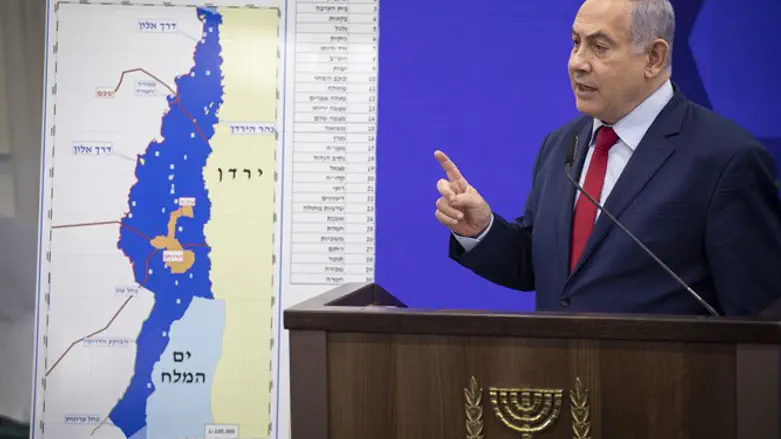
Top Israeli officials involved in the preparation of Prime Minister Binyamin Netanyahu’s sovereignty plan are weighing an alternative, scaled-down plan which would limit the scope of the application of Israeli sovereignty to existing Israeli towns in Judea and Samaria, according to a report by Maariv Friday morning.
The report cited Israeli officials who claim that the Israeli team preparing the plan for the application of Israeli sovereignty to parts of Judea and Samaria is considering radically altering the plan, dropping the proposed extension of sovereignty over a large bloc of territory in Judea and Samaria, and focusing exclusively on Israeli towns in the area.
Up until now, the sovereignty plan was closely tied to the proposal for Israeli sovereignty drawn up in the Trump administration’s Middle East peace plan, under which Israel would apply sovereignty to most of the Jordan Valley, the Dead Sea area, and blocs of territory close to the pre-1967 Israeli border.
The plan would place around 30% of Judea and Samaria under Israeli sovereignty, including roughly half of Area C, which is under full Israeli control, but which is not under Israeli law.
Under this arrangement, Israel would extend sovereignty to all of its towns in Judea and Samaria, with all but 15 included in a larger, contiguous bloc of territory to be put under Israeli law.
The fifteen Israeli towns not included in the contiguous bloc would be placed under Israeli law, but would be separated territorially from the rest of the country, remaining isolated enclaves. In these enclaves, Israel would be restricted from expanding existing towns or building new communities for the next four years – or jeopardize American recognition of the sovereignty plan.
Those restrictions angered some settlement leaders, who said the move would leave 15 towns cut off from the rest of the country and unable to expand, making them “second class communities”.
In addition, settlement leaders warned the plan could exclude as many as 25 fledging settlement communities, home to several thousand Israeli residents.
Right-wing critics of the plan also expressed concern the sovereignty plan, undertaken as part of the larger Trump peace plan, could become a backdoor to Palestinian statehood, with Israel effectively ceding 70% of Judea and Samaria to a future Palestinian state.
Furthermore, foreign leaders, including German Foreign Minister Heiko Maas, who visited Israel Wednesday, have pressured Israel against applying sovereignty, leading Israel’s team responsible for drawing up the proposal to consider an alternative plan.
According to Israeli officials cited by the Maariv report, the alternate sovereignty proposal would not create larger blocs of contiguous territory under Israeli sovereignty in Judea and Samaria, but instead would limit the application of sovereignty to the Israeli towns themselves.
This narrower sovereignty plan would have the added benefit of allowing Israel to move forward without drawing detailed maps delineated the boundaries of the application of sovereignty, thus making it easier to bring the plan to the Knesset for a vote after July 1st.
Settlement leaders from the Yesha Council – which represents all Israelis living in Judea and Samaria – say the government has not approached them about this possible alternative plan. The settlement leaders cited by the Maariv report added that they saw some benefits to such a plan, in that it would not lead to the creation of ‘second class communities’.
MK Bezalel Smotrich (Yamina) also said that the alternative plan could obviate some of the challenges created by the original version of the plan.
“There are advantages to applying sovereignty just to the towns themselves and not to entire areas, since in this case it allows us to dispense with the need for drawing up maps and borders.”
“It also provides an answer to the real fears in Israel that the drawing up of maps could pave the way for the establishment of a Palestinian state. This way, we could both normalize live in these towns and continue to develop them, while also avoiding the dangers of drawing up fixed borders and de facto agreement to Palestinian statehood.”
